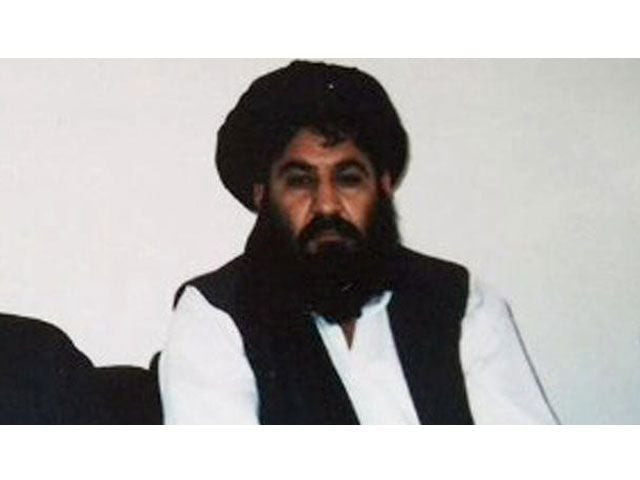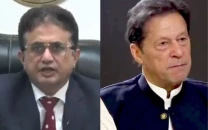US, Pakistan continue to bicker over Mullah Mansour's death
US Special Representative for Afghanistan and Pakistan says Mullah Mansour was an obstacle to peace

US Special Representative for Afghanistan and Pakistan says Mullah Mansour was an obstacle to peace. A file photo of Taliban chief Mullah Akhter Mansoor.
On May 21, Mullah Mansour was killed in a rare US drone strike in Naushki district of Balochistan. Condemning the attack, Pakistan said the US violated the commitment it made earlier at the quartet meeting that "talks remain the only option for bringing an end to the lingering conflict in Afghanistan."
Drone strike on Pakistani soil detrimental to relations with US: Army chief
However, defending the drone strike, US Special Representative for Afghanistan and Pakistan, Richard Olson said, "Taliban’s repeated refusal to join talks with the Afghan government contributed to US government's decision to take action against Mullah Mansour on May 21.
"Some commentators have speculated that this strike represented a shift in US strategy or a weakening of our commitment towards peace process but it has not,” the envoy said.
He further pointed out that not only was "Mullah Mansour an obstacle to peace, he posed a continued threat to US nationals through his support towards operations against US forces, and was perpetuating a war without an end.”
Afghan Taliban leader Mullah Mansour killed in US drone strike in Pakistan
Acknowledging that conflict in Afghanistan cannot end through military solution, Olson stated that "the future of Afghanistan will be decided through discussion, negotiation, and reconciliation.”
“We will also continue to encourage an Afghan-led, Afghan-owned peace process in which the government in Kabul and Taliban can bring this conflict to an end,” he said.
Olson further underscored the need for “persistent coordination and cooperation between Afghanistan and Pakistan” as a crucial aspect of long-term regional stability, while adding that US remains committed to serving as a constructive conduit in advancing these efforts.
"There is space for the Afghan Taliban to integrate in Afghanistan’s pluralistic society, with the Afghan constitution providing protections for all Afghans – regardless of their ideology," he added.
“Let me say that the Taliban are mistaken if they think they can wait for us to withdraw our support, believing that Afghan forces will become vulnerable to defeat as the international community disengages,” Olson stated.
Richard Olson appointed US special envoy for Pakistan, Afghanistan
“If the Taliban are serious about their stated goal of withdrawal of foreign forces, then as President Obama stated earlier, it should be clear to the Taliban and all those who oppose Afghanistan’s progress, that the only real way to achieve the full draw-down of US and foreign troops from Afghanistan is to join a meaningful a lasting political settlement with the Afghan government.”
Taliban refused to participate in talks under the Quadrilateral Coordination Group comprising of Afghanistan, Pakistan, China, and the United States early March and launched their annual operations known as Spring Offensive in mid-April.
Lodhi reiterates Pakistan's stance in the UN
Meanwhile, Pakistan stuck to its guns by condemning the drone strike at the United Nations Security Council on Monday, describing it as an unacceptable and blatant violation of Pakistan's sovereignty and of the UN charter and international law.
Speaking in the quarterly debate on Afghanistan in the Council, Pakistan's ambassador Dr Maleeha Lodhi also reacted sharply to the allegations made by the Afghan representative, calling them unjustified, untrue and gratuitous.
While expressing Pakistan’s readiness to support a genuine Afghan peace process, Lodhi warned that her country would not tolerate violations of its sovereignty and its territorial integrity, “from whatever source”.
Further, she pointed out that the international community was well aware of and acknowledged Pakistan's contribution and sacrifices in the fight against terrorism.
Lodhi questioned whether the international community wanted a negotiated peace or a military solution in Afghanistan, warning that those seeking a renewed recourse to a military solution need to think through the consequences of their posture.
“Is it ready to invest in war rather than peace in Afghanistan?” she asked the 15-member Security Council.
Referring to the Secretary General's report on Afghanistan, the Pakistani envoy said that this reinforced the firm international consensus that, ‘only by a negotiated political agreement will Afghans achieve sustainable peace’.
“This is precisely what Pakistan has long proposed as the only course to end the decades of war and suffering in Afghanistan,” she said.
Based on this belief in a negotiated peace, and in response to repeated requests from Afghan President Ashraf Ghani, she said Pakistan agreed to facilitate the first-ever direct peace talks between the Afghan government and the Afghan Taliban in Murree in June 2015.
Depicting these talks as a ‘promising start’, the ambassador regretted that days before the second round, in which the two sides were to also consider a de-escalation of violence, the talks were scuttled by developments that were well known to all, she said.
Lodhi also referred to concerted efforts that led to the establishment of the Quadrilateral Coordination Group (QCG) by which Afghanistan, the US, China and Pakistan undertook to join together to provide a decisive impetus to Afghan peace efforts.
The process, welcomed by the international community was undermined by the US drone attack of 21 May which killed the Taliban leader, Mullah Akhtar Mansour, she added.
This action has dealt “a blow to the Afghan peace process” and added to the intensity and complexity of the Afghan conflict, she maintained. She also asked whether it was an accident that the peace process was scuttled twice in one year.
Lodhi argued that for the past 15 years the use of military force has failed to stabilise Afghanistan. “Continued resort to military means will further destabilise the situation in Afghanistan and the region.” she said while advising against such a strategy.
Referring to Operation Zarb-e-Azb as the largest and most effective anti-terrorism campaign anywhere in the world, she said that Pakistan had achieved substantial gains and was determined to eliminate all terrorist threats within the country.
Urging the Afghan government and the international coalition to take action against Tehreek-e-Taliban elements, which have sought refuge in Afghanistan, Lodhi emphasised that the elimination of these sanctuaries was essential to peace and security.
She regretted that the Afghan government’s inability to finalise border SOPs and establish a Joint Border Commission as proposed by Pakistan.
“Effective border management is the sovereign right of my country”, she said and added that “Pakistan will take measures on its side of the border accordingly”.



















COMMENTS
Comments are moderated and generally will be posted if they are on-topic and not abusive.
For more information, please see our Comments FAQ